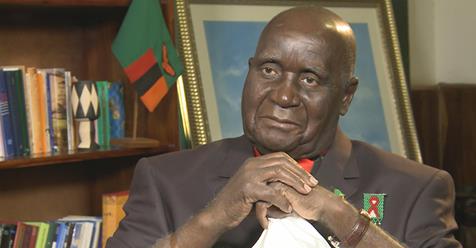Former Zambian President Kenneth Kaunda receives lifetime award
Published on December 11, 2019 at 10:25 AM by Face of Malawi
ZAMBIA – Former Zambian President Kenneth Kaunda received a lifetime award Monday for his efforts in promoting transparency and fighting corruption.

He was bestowed the honor at the fourth International Anti-Corruption Excellence (ACE) Awards during a ceremony in Rwanda’s capital Kigali.
Kaunda, 95, did not travel to Kigali. Instead, his youngest daughter, Cheswa Silwizya, accepted the award on his behalf.
Kaunda became the newly independent Zambia’s first president in 1964.
He is credited with fighting during his entire public career to ensure good governance and upholding the rights of people regardless of their nationality or background.
The fourth edition of the annual Sheikh Tamim Bin Hamad Al Thani International anti-corruption Excellence Award ceremony was hosted by Rwanda in collaboration with the government of Qatar.
The award is split into four categories, including Lifetime or Outstanding Achievement, Academic Research and Education, Youth Creativity and Engagement, and Innovation.
The winners in the category of Academic Research and Education were Maria Krambia-Kapardis from Cyprus and Alban Koci from Albania.
Krambia-Kapardis is the founder and first chair of Transparency International-Cyprus, whose research includes fraud detection.
Koci, a law professor at the University of Tirana, is responsible for anti-corruption programs for the university as well as for high schools in Tirana which include mock trials and awareness programs focusing on combatting corruption.
In the category of Youth Creativity and Engagement, the winner was Jean-Jacques Lumumba from the Democratic Republic of Congo. He was credited for his work as a whistleblower while serving as an executive at a major bank embroiled in a misappropriations scandal.
In the Innovation category, the award went to Melody Zambuko from Zimbabwe and Matt Clark.
The ACE award aims to raise awareness, support and solidarity to combat corruption while encouraging new initiatives to ensure corrupt-free societies.
The award serves as a tool to highlight exemplary and noteworthy actions and good practices on a global platform and to assess, promote, collect and disseminate anti-corruption models from all over the world.
An initiative of the government of Qatar, the ACE award is presented on International Anti-Corruption Day on Dec. 9 in cooperation with the Vienna-based United Nations Office on Drugs and Crime (UNODC).
Yury Fedotov, executive director of UNODC and director-general of the UN Office in Vienna, in a statement said corruption affects people in their daily lives and bars them from accessing resources and opportunities.
“It erodes trust in public institutions and compromises the social contract. In doing so, corruption thwarts our attempts at building a better world. As we enter a decade of ambitious action to achieve the Sustainable Development Goals on time, stepping up efforts to eradicate corruption and promote good governance is essential if we are to deliver on our global pledge to leave no one behind,” he said.
The award ceremony was preceded by the unveiling of an “anti-corruption monument” erected in Kigali.
Rwandan President Paul Kagame said the sculpture symbolizes both the openness and firm resolve needed to prevail in the fight against corruption.
Present were Amir of Qatar Sheikh Tamim bin Hamad al-Thani, Namibian President Hage Geingob and African Union Commission Chairperson Moussa Faki as well as other dignitaries.
Despite advances at the international level, there has been little progress in fighting corruption, according to Transparency International’s 2017 Corruption Perceptions Index.
The global anti-corruption watchdog showed that many countries have made little to no progress in ending corruption.
Corruption chips away at democracy to produce a vicious cycle where it undermines democratic institutions, and in turn, weak institutions are less able to control corruption, according to Transparency International.
Credit : Zambia Reports


